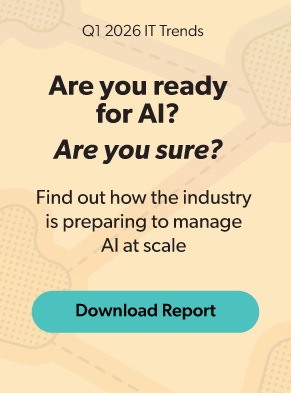The past few years have seen an impressive wave of AI advancements that quickly made their way into the workplace. Now, AI plays a crucial role in helping organizations thrive. In particular, AI has become a powerful ally for small and medium-sized enterprises (SMEs). AI’s ability to generate viable business content, provide quick access to information, and offer affordable support makes enterprise-level resources increasingly accessible to smaller companies.
This advantage is not lost on SMEs: 90% of SMEs are already using or plan to use AI.
However, as a new and burgeoning technology, AI also brings on its share of doubt and risk. In this blog, we’ll explore how AI impacts SMEs by making them faster, more strategic, and more efficient, and the concerns that come with this new technology adoption.
Better Productivity and Efficiency
One of the biggest advantages of AI for SMEs is how it improves productivity and efficiency. AI tools can automate many tasks, helping businesses work faster and more accurately. For example, AI-powered content generation tools can quickly create marketing materials, draft legal documents, and write low-level code. This saves time and reduces labor costs, allowing businesses to allocate resources to other important areas.
AI-generated content should always be treated as drafts, and it should always be reviewed by a human. AI is still known to “hallucinate,” or make up information that isn’t true. Learn more in our blog: 5 Surprising Ways AI Has Improved Our Work Lives (And 3 Reasons It Won’t Replace Our Jobs).
Access to these types of resources has historically been expensive — sometimes prohibitively so for SMEs, especially when it comes to in-house talent. While AI-generated content still requires review, getting one person to review an AI-generated document is typically much faster and more cost-effective than paying for the entire ideation, creation, and review process. In short, AI makes high-quality work faster, more affordable, and more accessible to SMEs. This helps level the playing field against larger competitors.
Faster Information Access
AI significantly enhances SMEs’ access to information, which allows leaders to make informed decisions quickly. With the ability to pull, interpret, and analyze large volumes of data in real time, AI tools provide insights that would otherwise take hours or days of manual labor to uncover. This real-time access to information helps SMEs respond quickly to market changes and customer needs while empowering employees to focus less on manually pulling data and more on strategic work.
When applied at the departmental level, this enhanced access to information can significantly improve strategic planning efforts. In marketing, for instance, AI tools analyze customer data to uncover preferences and behaviors, allowing businesses to create highly targeted campaigns. In IT departments, AI can support strategic planning by analyzing system performance and identifying potential areas for improvement or review past support tickets to pinpoint recurring issues and recommend proactive measures. This information would enable IT leaders to allocate resources more effectively, prioritize system upgrades, and strengthen cybersecurity measures.
Streamlined Operations
AI significantly improves SMEs’ efficiency across various functions, from supplementing customer service efforts with chatbots to optimizing the supply chain with better data insights. These low-cost, easy-to-implement efficiencies help further close the gap between SMEs and their enterprise counterparts.
AI’s ability to streamline operations may help to combat the SaaS sprawl that so many SMEs face. While 84% of IT pros would prefer a single platform to manage user identity, access, and security, the majority require more than five (10% require more than 15!). AI can help IT teams identify inefficiencies and replace them with more efficient alternatives.
Addressing Security, Privacy, and Ownership Concerns
While AI offers many advantages, it also raises some significant concerns. For one, generative AI is so new that policies and regulations around them are still being developed. About two-thirds (67%) of SMEs have developed policies around AI – that’s up slightly from 63% in Q1 2024, but that still leaves about a third that don’t have AI policies yet. Further, some SMEs are concerned with the way AI tools store sensitive information — both input by the user and potentially proprietary output, like generated code.
Additionally, and perhaps most importantly, SMEs are concerned about the security implications of AI: 61% of IT professionals working at SMEs say that AI is outpacing their organization’s ability to protect against threats. What’s more, 25% of SMEs fell victim to an AI-generated attack in 2024 alone.
As AI becomes a more prominent player in the workplace, it’s important for SMEs to consider these risks as they adopt new AI tools. IT leaders should work toward formalizing policies around AI use and pay close attention to the way they secure their tools and users’ access to them.
What Else Makes SMEs Tick?
AI adoption is just one of the topics covered in JumpCloud’s SME IT Trends report. We surveyed more than 600 IT professionals from SMEs about their experiences with budgeting, vendor management, security, and various other subjects. To discover how your peers are navigating their roles and the IT landscape, download the full report.




